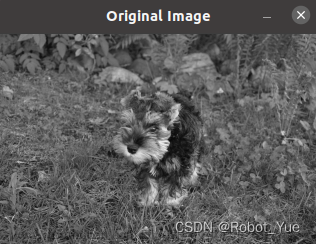一、介绍
图像拼接.
二、分步实现
要实现图像拼接,简单来说有以下几步:
- 对每幅图进行特征点提取
- 对对特征点进行匹配
- 进行图像配准
- 把图像拷贝到另一幅图像的特定位置
- 对重叠边界进行特殊处理
PS:需要使用低版本的opencv,否则无法使用特征角点提取算子。
#include "highgui/highgui.hpp"
#include "opencv2/nonfree/nonfree.hpp"
#include "opencv2/legacy/legacy.hpp"
#include <iostream>
using namespace cv;
using namespace std;
typedef struct
{
Point2f left_top;
Point2f left_bottom;
Point2f right_top;
Point2f right_bottom;
}four_corners_t;
four_corners_t corners;
void CalcCorners(const Mat& H, const Mat& src)
{
// 左上角(0, 0, 1)
double v2[3] = { 0, 0, 1 };
double v1[3] = { 0 };
Mat V2 = Mat(3, 1, CV_64FC1, v2);
Mat V1 = Mat(3, 1, CV_64FC1, v1);
V1 = H * V2;
corners.left_top.x = v1[0] / v1[2];
corners.left_top.y = v1[1] / v1[2];
// 左下角(0, src.rows, 1)
v2[0] = 0;
v2[1] = src.rows;
v2[2] = 1;
V2 = Mat(3, 1, CV_64FC1, v2);
V1 = Mat(3, 1, CV_64FC1, v1);
V1 = H * V2;
corners.left_bottom.x = v1[0] / v1[2];
corners.left_bottom.y = v1[1] / v1[2];
// 右上角(src.cols, 0, 1)
v2[0] = src.cols;
v2[1] = 0;
v2[2] = 1;
V2 = Mat(3, 1, CV_64FC1, v2);
V1 = Mat(3, 1, CV_64FC1, v1);
V1 = H * V2;
corners.right_top.x = v1[0] / v1[2];
corners.right_top.y = v1[1] / v1[2];
// 右下角(src.cols, src.rows, 1)
v2[0] = src.cols;
v2[1] = src.rows;
v2[2] = 1;
V2 = Mat(3, 1, CV_64FC1, v2);
V1 = Mat(3, 1, CV_64FC1, v1);
V1 = H * V2;
corners.right_bottom.x = v1[0] / v1[2];
corners.right_bottom.y = v1[1] / v1[2];
}
void OptimizeSeam(Mat& img1, Mat& trans, Mat& dst)
{
int start = MIN(corners.left_top.x, corners.left_bottom.x);//开始位置,即重叠区域的左边界
double processWidth = img1.cols - start; // 重叠区域的宽度
int rows = dst.rows;
int cols = img1.cols; // 注意,是列数*通道数
double alpha = 1; // img1中像素的权重
for (int i = 0; i < rows; i++)
{
uchar* p = img1.ptr<uchar>(i); // 获取第i行的首地址
uchar* t = trans.ptr<uchar>(i);
uchar* d = dst.ptr<uchar>(i);
for (int j = start; j < cols; j++)
{
// 如果遇到图像trans中无像素的黑点,则完全拷贝img1中的数据
if (t[j * 3] == 0 && t[j * 3 + 1] == 0 && t[j * 3 + 2] == 0)
{
alpha = 1;
}
else
{
// img1中像素的权重,与当前处理点距重叠区域左边界的距离成正比,实验证明,这种方法确实好
alpha = (processWidth - (j - start)) / processWidth;
}
d[j * 3] = p[j * 3] * alpha + t[j * 3] * (1 - alpha);
d[j * 3 + 1] = p[j * 3 + 1] * alpha + t[j * 3 + 1] * (1 - alpha);
d[j * 3 + 2] = p[j * 3 + 2] * alpha + t[j * 3 + 2] * (1 - alpha);
}
}
}
int main(int argc, char* argv[])
{
Mat image01 = imread("image2.png", 1); //右图
Mat image02 = imread("image1.png", 1); //左图
imshow("p2", image01);
imshow("p1", image02);
// 灰度图转换
Mat image1, image2;
cvtColor(image01, image1, CV_RGB2GRAY);
cvtColor(image02, image2, CV_RGB2GRAY);
// 提取特征点
SurfFeatureDetector Detector(2000);
vector<KeyPoint> keyPoint1, keyPoint2;
Detector.detect(image1, keyPoint1);
Detector.detect(image2, keyPoint2);
// 特征点描述
SurfDescriptorExtractor Descriptor;
Mat imageDesc1, imageDesc2;
Descriptor.compute(image1, keyPoint1, imageDesc1);
Descriptor.compute(image2, keyPoint2, imageDesc2);
FlannBasedMatcher matcher;
vector<vector<DMatch> > matchePoints;
vector<Mat> train_desc(1, imageDesc1);
matcher.add(train_desc);
matcher.train();
matcher.knnMatch(imageDesc2, matchePoints, 2);
cout << "total match points: " << matchePoints.size() << endl;
// Lowe's algorithm,获取优秀匹配点
vector<DMatch> GoodMatchePoints;
for (int i = 0; i < matchePoints.size(); i++)
{
if (matchePoints[i][0].distance < 0.4 * matchePoints[i][1].distance)
{
GoodMatchePoints.push_back(matchePoints[i][0]);
}
}
// draw match
Mat first_match;
drawMatches(image02, keyPoint2, image01, keyPoint1, GoodMatchePoints, first_match);
imshow("first_match ", first_match);
vector<Point2f> imagePoints1, imagePoints2;
for (int i = 0; i < GoodMatchePoints.size(); i++)
{
imagePoints2.push_back(keyPoint2[GoodMatchePoints[i].queryIdx].pt);
imagePoints1.push_back(keyPoint1[GoodMatchePoints[i].trainIdx].pt);
}
// 获取图像1到图像2的投影映射矩阵 尺寸为3*3
Mat homo = findHomography(imagePoints1, imagePoints2, CV_RANSAC);
cout << "变换矩阵为:\n" << homo << endl << endl; // 输出映射矩阵
// 计算配准图的四个顶点坐标
CalcCorners(homo, image01);
cout << "left_top:" << corners.left_top << endl;
cout << "left_bottom:" << corners.left_bottom << endl;
cout << "right_top:" << corners.right_top << endl;
cout << "right_bottom:" << corners.right_bottom << endl;
// 图像配准
Mat imageTransform1, imageTransform2;
warpPerspective(image01, imageTransform1, homo, Size(MAX(corners.right_top.x, corners.right_bottom.x), image02.rows));
// warpPerspective(image01, imageTransform2, adjustMat*homo, Size(image02.cols*1.3, image02.rows*1.8));
imshow("直接经过透视矩阵变换", imageTransform1);
// 创建拼接后的图,需提前计算图的大小
int dst_width = imageTransform1.cols; // 取最右点的长度为拼接图的长度
int dst_height = image02.rows;
Mat dst(dst_height, dst_width, CV_8UC3);
dst.setTo(0);
imageTransform1.copyTo(dst(Rect(0, 0, imageTransform1.cols, imageTransform1.rows)));
image02.copyTo(dst(Rect(0, 0, image02.cols, image02.rows)));
imshow("b_dst", dst);
// 优化拼接处
OptimizeSeam(image02, imageTransform1, dst);
imshow("dst", dst);
waitKey();
return 0;
}


 文章来源:https://www.toymoban.com/news/detail-689796.html
文章来源:https://www.toymoban.com/news/detail-689796.html
三、利用stitch实现
#include "opencv2/imgcodecs.hpp"
#include "opencv2/highgui.hpp"
#include "opencv2/stitching.hpp"
#include <iostream>
using namespace std;
using namespace cv;
int main(int argc, char* argv[])
{
Mat img1 = imread("image1.png", cv::IMREAD_COLOR);
Mat img2 = imread("image2.png", cv::IMREAD_COLOR);
vector<Mat> imgs;
imgs.push_back(img1);
imgs.push_back(img2);
Mat pano;
Ptr<Stitcher> stitcher = Stitcher::create(Stitcher::PANORAMA);
Stitcher::Status status = stitcher->stitch(imgs, pano);
if (status != Stitcher::OK)
{
cout << "Can't stitch images, error code = " << int(status) << endl;
return EXIT_FAILURE;
}
string result_name = "result1.jpg";
imwrite(result_name, pano);
cout << "stitching completed successfully\n" << result_name << " saved!";
return EXIT_SUCCESS;
}
 文章来源地址https://www.toymoban.com/news/detail-689796.html
文章来源地址https://www.toymoban.com/news/detail-689796.html
到了这里,关于利用OpenCV实现图像拼接的文章就介绍完了。如果您还想了解更多内容,请在右上角搜索TOY模板网以前的文章或继续浏览下面的相关文章,希望大家以后多多支持TOY模板网!













